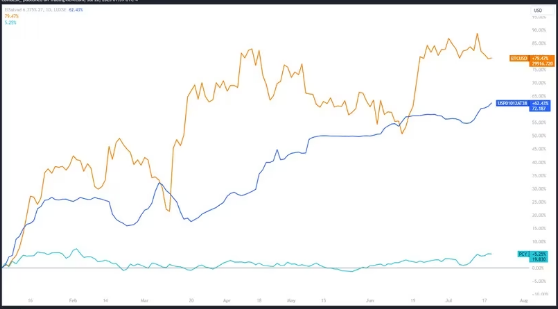Bitcoin ETF Rally Creates Ripple Effect: El Salvador’s Bonds Skyrocket 62%
The spectacular performance of El Salvador’s bonds, which saw an astonishing 62% increase over the past six months, impressed investors. The adoption of Bitcoin as a recognized payment mechanism marked a dramatic improvement in the country’s financial fortunes.
El Salvador’s bonds rose with the increase in Bitcoin prices, demonstrating an unexpected and surprising correlation between the two commodities. The increase in Bitcoin prices was driven by the advent of Exchange-Traded Funds (ETFs).
El Salvador’s choice to adopt Bitcoin as part of its economy improved the country’s financial situation and showed how positively cryptocurrencies could affect established economic systems.
The country’s bonds rose to previously unheard-of heights as prices of the top crypto recovered due to increasing investor interest in ETFs, showing the newfound economic potential and the significance of digital currencies worldwide.

Source: TradingView
Cryptocurrencies Reshaping Economies
This unanticipated coupling of Bitcoin and the country’s bonds offered a motivating case study for investors and governments everywhere, luring more significant investigation into the function of cryptocurrencies in reshaping contemporary financial landscapes.
Midway through 2021, El Salvador declared Bitcoin a legal tender and started stockpiling the digital currency. According to figures by Bloomberg, the nation held 2,546 bitcoin as of April. According to the most recent market data, the digital assets, which cost $108.2 million to purchase, are now worth $76.6 million.
It did not go down very well when El Salvador decided to adopt and begin amassing bitcoins as a form of currency. Rating agencies and the International Monetary Fund both continued to express their disapproval of the move.
Bitcoin drops below the key $30K region. Chart: TradingView.com
Meanwhile, based on Factset statistics, one of the biggest holders of El Salvador’s debt, the Invesco Emerging Markets Sovereign Debt ETF (PCY), has underperformed the country’s international bonds.
The nation said in January that it had paid back a $800 million bond that Moody’s had anticipated it would not be able to.
El Salvador’s debt rating declined in September 2022, and according to forecasts, a default could occur in January 2023. Since then, the price of the nation’s junk-rated bonds has soared, following the trend of Bitcoin.
On Debt Ratings And Junk Bonds
A debt rating is an evaluation provided by ratings agencies such as Fitch or Moody’s to assess the creditworthiness and risk associated with a country’s or a company’s debt securities (such as bonds). The rating helps investors and creditors gauge the likelihood of the issuer defaulting on its debt obligations.
“Junk-rated bonds” refer to bonds rated below investment grade (typically BB and below), indicating an increased risk of default. The increase in value of these bonds suggests that investors may have become more optimistic, or that market conditions drove bond prices higher despite the elevated risk.
Bitcoin Tries To Move Past $30,000
Bitcoin’s price considerably increased over its performance in 2022, even though it is presently fighting to stay over $30,000 with a heavy resistance near $31,000.
At the time of writing, Bitcoin was trading at $29,840, down 1.1% in the last 24 hours, and losing nearly 5% in value in the last seven days, data from crypto market tracker Coingecko shows.
A more general market tendency appears to manifest in the recent change in Salvador’s bond fortunes. Notably, compared to investment-grade bonds earlier this year, the performance of not only the country’s but also junk-rated bonds from other nations, including Turkey, Argentina, and Nigeria, has increased noticeably.
Indications are growing that El Salvador’s bond market fortunes are not unique but part of a more prominent pattern affecting other emerging market economies.
Featured image from Eternity Law International
